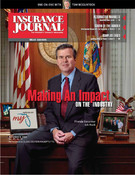In a look at the race for Governor of California, Insurance Journal recently chatted with State Sen. Tom McClintock (R) who is running to succeed Gray Davis should the Recall Vote be successful on Oct. 7.
McClintock was first elected to the California Legislature in 1982 at the age of 26. Within two years, he became Assembly Republican Whip, a leadership position he held for five years. In 1984, McClintock was named one of five outstanding young Californians by the California Jaycees, and received the civilian Medal of Merit from the Ventura County Peace Officers Association for rescuing an elderly man from a condominium fire.
After leaving the Assembly in 1992, McClintock served as Director of the Center for the California Taxpayer, a project of the National Tax Limitation Foundation. He also won the 1992 Republican nomination for California’s 24th Congressional seat and narrowly lost the General Election to Congressman Tony Beilenson.
After another close election in the 1994 Controller’s race, McClintock was named Director of Economic and Regulatory Affairs for the Claremont Institute’s Golden State Center for Policy Studies, a position he held until his return to the Assembly in 1996.
In 1996, McClintock was overwhelmingly returned to the State Assembly from the 38th Assembly District. He served two terms before his election in 2000 to the State Senate.
As he heads into the 2003 race, McClintock faces several challenges on the Republican side, including actor Arnold Schwarzenegger. On the Democratic side, Lt. Gov. Cruz Bustamante looks to take control of the state if Davis is recalled. The campaign has seen some 135 candidates enter the race, searching to be California’s next leader. Below are excerpts from the interview with McClintock.
Insurance Journal: What have your experiences been so far in the race and were you surprised at the number of entrants?
Sen. Tom McClintock: It is like lighting a rocket and hanging on for dear life. We (wife Lori) have two children—ages 13 and 11—and we had a long discussion over a period of several days on how all this would impact our family. We came to the conclusion that if this state does not see a dramatic change in its policies, our children have no future. That was a very sobering and very clear consideration. As for the number of candidates, I really hadn’t made any predictions on how many people would enter this race.
IJ: If elected California’s next Governor, what will be some of your first acts in office?
McClintock: I’ve said within moments of taking the oath of office that one of the first three acts I will take is to call a special session of the Legislature for the express purpose of replacing California’s workers’ comp law with Arizona’s. The principal difference between the two is that California compensates for injuries that cannot be verified by any objective medical standards known to science. California is virtually alone in the nation in compensating aches, pains and worries that cannot be verified by an objective medical standard. That causes prices to soar while benefits for the truly injured workers remain fairly low. The nice thing about the Arizona law is that it works and it costs Arizona business’ one third what Californians are now paying. They (Arizona) have the lowest rates in the Western United States. Workers’ comp is crucial to people in this state, it’s the difference between people closing their doors and making a go of it. We’re seeing that in the employment numbers. We’ve had a net loss of nearly a third of a million jobs in the last 2 1/2 years. Those numbers are historic. (When asked about lawyers and special interests contributing to the workers’ comp problem, McClintock noted:) As for lawyers and special interests being a problem, I’ll give the Legislature 30 days to enact that reform and if they fail to do so, we’ll take it to the people and let them (Legislature) explain to the voters why they failed to act while the job market was collapsing. The entire tort system is out of control. You can’t bring insurance costs down until you bring the tort system under control. One of the most important reforms in the tort law of the state is to separate out the punitive damages that have no business being in a civil court. That is strictly a function and in fact the purpose of the criminal court. It operates under different standards, a higher threshold for evidence and unanimous jury verdict.
IJ: What are your thoughts on state vs. federal regulation of insurance?
McClintock: I believe the government has two basic functions in a marketplace. It is there to assure that representations are accurate and is there to ensure contracts are enforced. Fraud is a major problem in workers’ comp. If you want to bring fraud down dramatically in our workers’ comp system, require clinical verification of an injury.
IJ: How do you feel the California Department of Insurance (CDI) has performed recently?
McClintock: In assessing the CDI, the Quackenbush scandal was beyond appalling. I think the corruption in the Quackenbush administration was corrected by his successor [Harry Low]. He [Low] did a reasonably good job of restoring a professional management over that department. I was not surprised John [Garamendi] ran for Governor. He has run before and he will run again. As for the current administration, I have not concentrated on the Garamendi administration in the last year, so I can’t answer that right now.
IJ: What are your thoughts on some of the other candidates running for Governor and our current Governor?
McClintock: I think the public has already formed its opinion of the Governor and they understand what is at stake. I try not to offer my thoughts on my opponents I prefer to concentrate my attention on my own race. I am concerned with the people [Arnold] Schwarzenegger has surrounded himself with. Obviously Warren Buffett is not the kind of fiscal advisor I’d rely on. The appointment of Rob Lowe, another Democratic activist within his [Schwarzenegger] group is also some concern. I think [Cruz] Bustamante has made it clear that a Bustamante administration will continue the policies of a Gray Davis administration with higher taxes. My job is set forth with my vision for the state’s future direction. I am confident the most important and powerful force in politics, particularly in times like these is something that cannot be measured or bought, but it is simply neighbors talking to neighbors. I was the top Republican vote getter in California last year and I’m confident I’m bringing in a very solid base of support. Californians are finally coming to the conclusion that socialism doesn’t work here or anywhere else it has been tried in the world. A professor in college once said that a conservative is a liberal who has been mugged. The people of California have been mugged by their government and I think they’re taking a whole new look at what they want to see in their state’s politics. People are watching state public policy like never before. They can see those 180-degree contortions that the Governor has been going through and they know the reasons for it.
IJ: Would a McClintock administration have more or less government in it?
McClintock: I expect to produce a dramatic reduction in the size and scope of the state government and expect to conduct a complete reorganization of the state bureaucracy and how we do business. I think the next Governor will take a page from Hiram Johnson’s book. He was Governor in 1910 and had a Legislature dominated by the special interests and realized that in order to make the changes he needed to make, he had to deal directly with the people. He ushered in a breathtaking period of reform that
has produced the re-initiative, the recall and the referendum. The next Governor of California has to be as serious about turning the state around and following a similar path. Twenty-one, 25 and 40 are three numbers you need to know about the California budget under the first four years of Davis. Twenty-one percent was the increase in inflation and population. Twenty-five was the increase in revenue in the same period. So it is obviously not a revenue problem, our revenues are growing faster than inflation and population combined.
Forty percent is the increase in spending during that period. It’s not as if we’ve had a 40 percent increase in highway construction, or schools or academic performance or other projects. We’ve had a very sizable increase in the state’s bureaucracy.
IJ: Do you think Californians in general think they pay too much for insurance?
McClintock: Yes, people do pay too much for insurance. An out of control tort system, out of control regulation and mandates have needlessly driven up the price not only for insurance but for most goods and services in this state.
To comment on this story, e-mail: dthomas@insurancejournal.com.
Was this article valuable?
Here are more articles you may enjoy.


 Winter Storm Fern to Cause Up to $6.7B in Insured Losses
Winter Storm Fern to Cause Up to $6.7B in Insured Losses  Charges Dropped Against ‘Poster Boy’ Florida Contractor Accused of Insurance Fraud
Charges Dropped Against ‘Poster Boy’ Florida Contractor Accused of Insurance Fraud  Trapped Tesla Driver’s 911 Call: ‘It’s on Fire. Help Please’
Trapped Tesla Driver’s 911 Call: ‘It’s on Fire. Help Please’  GEICO Settles Call-Center Worker Suits for $940,000; Attorneys Get Half
GEICO Settles Call-Center Worker Suits for $940,000; Attorneys Get Half 


